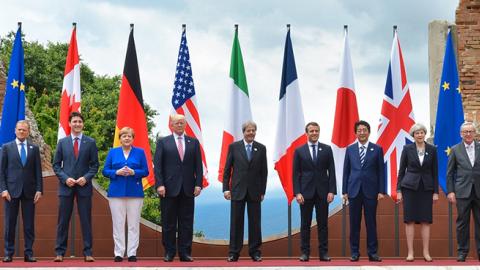Foreign policy is a funny thing: the results are often the opposite of what you want. Clearly President Trump went to the two European summits (the NATO summit in Brussels and the G-7 summit in Sicily) intending to deliver a tough message. But the net result of his intervention has been to reduce American influence in Europe and to give both Merkel and Macron some lovely political gifts.
Merkel has already taken her check to the bank; Trump’s negative messages, and the intense coverage of his undiplomatic language in the German press, allowed her to set her electoral house in order, undermine her Social Democratic challengers, and prepare the ground for some much needed policy changes once the German elections are over.
With the U.S. and Britain now “unreliable“, she said, Europe must now take more care of itself. This is a winning message in Germany. Unease about the United States is always a factor in German politics, and Trump makes George W. Bush and Ronald Reagan look popular in Germany. His unilateralism, his anti-German rhetoric, his open skepticism about climate change all grate on German sensibilities; from the far-Left to the far-Right, there is hardly a person in Germany who hasn’t been both offended and annoyed by Trump. If Trump had behaved more diplomatically in Brussels and Sicily, spouting bland platitudes about cooperation, hailing the depth of U.S.-German friendship and praising Angela Merkel for her leadership, she would now be trying to figure out how to distance herself from an unwelcome and politically damaging embrace. But as it is, she can criticize Trump, distance her Administration and her party from an unpopular U.S. president, and do it all while professing undying loyalty to the highest values of the western alliance.
This is a wonderful break for her. Traditionally in German politics, the center-Right coalition has stood for closer cooperation with the United States; back in the 1950s that worked fairly well, as enough Germans were worried by the Soviet threat to prefer a close relationship with the U.S. At times since then—during the Vietnam War, for example, and again during the Iraq War, the German Left has been able to play the U.S. card against the Right.
Not this time; Merkel has seized the high anti-Trump ground; the Social Democrats will be reduced to squeaking “Us, too!”
Meanwhile, the sense of unease that many Germans will feel as unpredictable changes rock the geopolitical landscape also redounds to Merkel’s advantage. She is the reassuring presence Germans have come to trust; many voters will think this is a bad time to risk disruptive changes in the German government.
Finally, the excitement over the friction with Trump helps bury any lingering bitterness on the German Right about the ill-judged migration initiative that put the first serious dent in Merkel’s public standing since she took office back in 2005. The Right will be united, the Left has lost its best cards, and the voters will be looking for stability rather than change.
For all this Angela Merkel owes Donald Trump a hearty thanks, though we doubt that she will send him a thank you note—or that he would be pleased by it if she did.
But helpful as Trump’s visit was to the German conservative, he may have done a bigger favor for the upstart Frenchman currently in the Elysée. Emmanuel Macron’s hand has been strengthened heading into what could be the most important round of talks between France and Germany in half a century.
The reason: an insecure and worried Germany will now need a strong partnership with France more than ever. Merkel can’t afford to see the EU rupture over Franco-German differences and can now use the parlous state of the international system to make a strong case to German public opinion for concessions to France (and other soft-money countries in Europe) that would be impossible under other circumstances.
Germany right now has bad relations with Russia, trouble with the United States, is losing Britain as a partner in the EU, and simply cannot afford to see the EU weaken. There is only one way to protect the EU and stabilize Germany’s neighborhood, and that is to re-invigorate the Franco-German partnership. This cannot be done without more concessions on eurozone governance than Germany has been willing to make in the past.
Macron and his team now have a unique opportunity to draw up a blueprint for eurozone reform that the Germans might actually accept. This is something that no French President has had for 20 years; it represents a historic opportunity for the new team.
The revival of French influence in the EU won’t be good news for Britain; it’s unfortunately likely that part of the French price will be a somewhat more protectionist tone in the Brexit negotiations. But overall, the slow withering away of the vitality of the eurozone and the sapping of the strength of the EU in the last ten years has been a disaster for the West, and for world order. A rebalancing EU may be less open and less Atlanticist than most American foreign policy experts might prefer, but the development of a united Europe has been a core American interest since the 1940s and remains one today.
Trump did not go to Europe planning to punish Britain, reward Germany and promote France, nor did he intend to revitalize the European project. But that may be exactly what he ended up doing. Interesting times ahead.

















